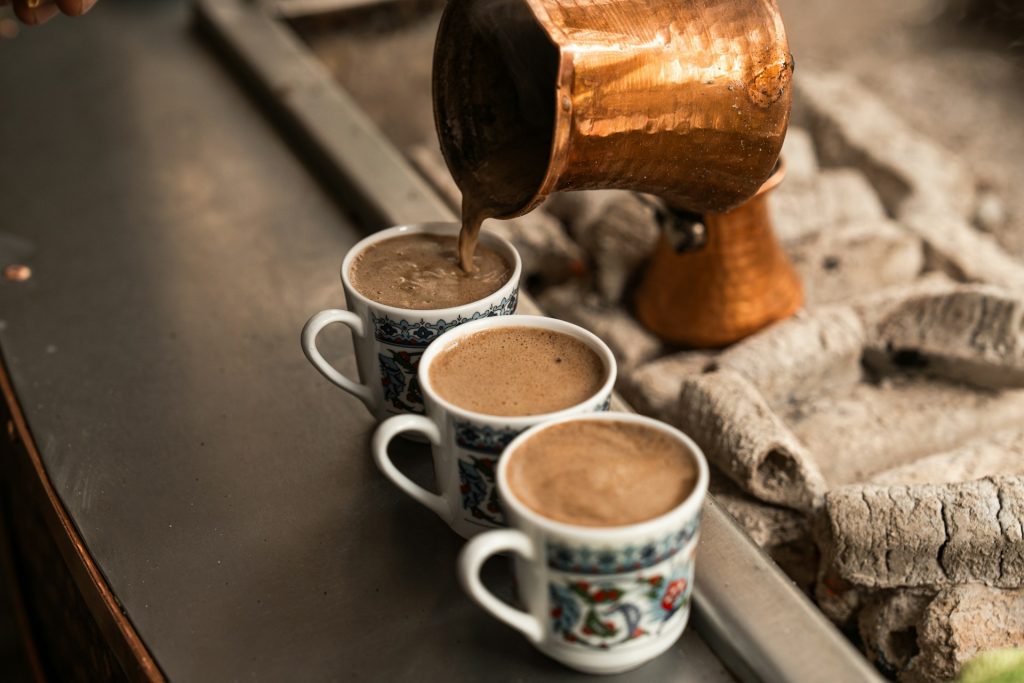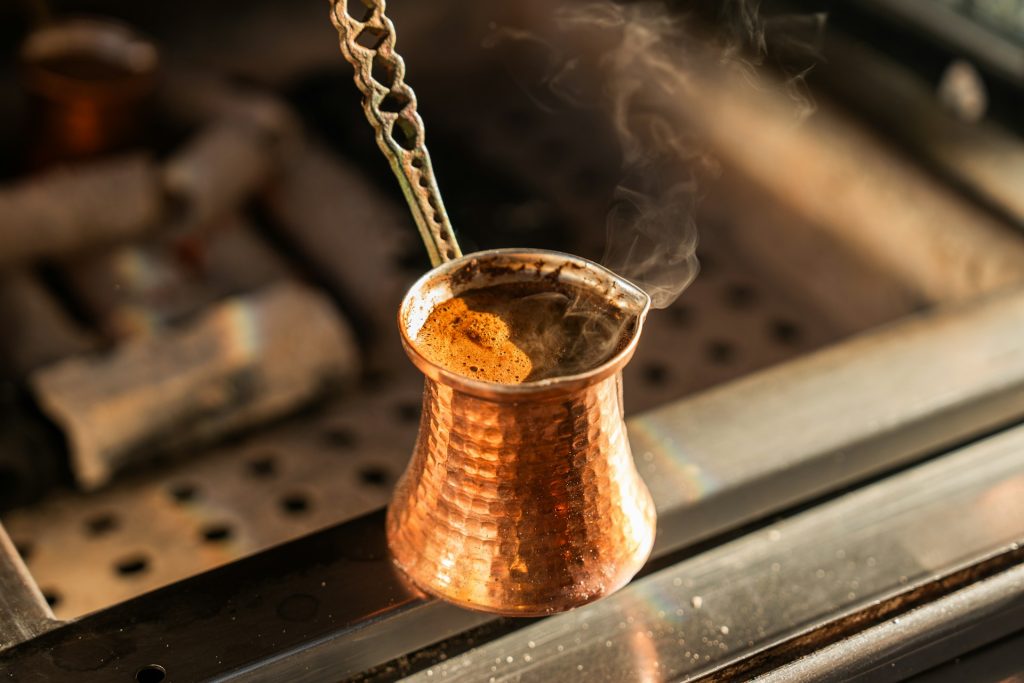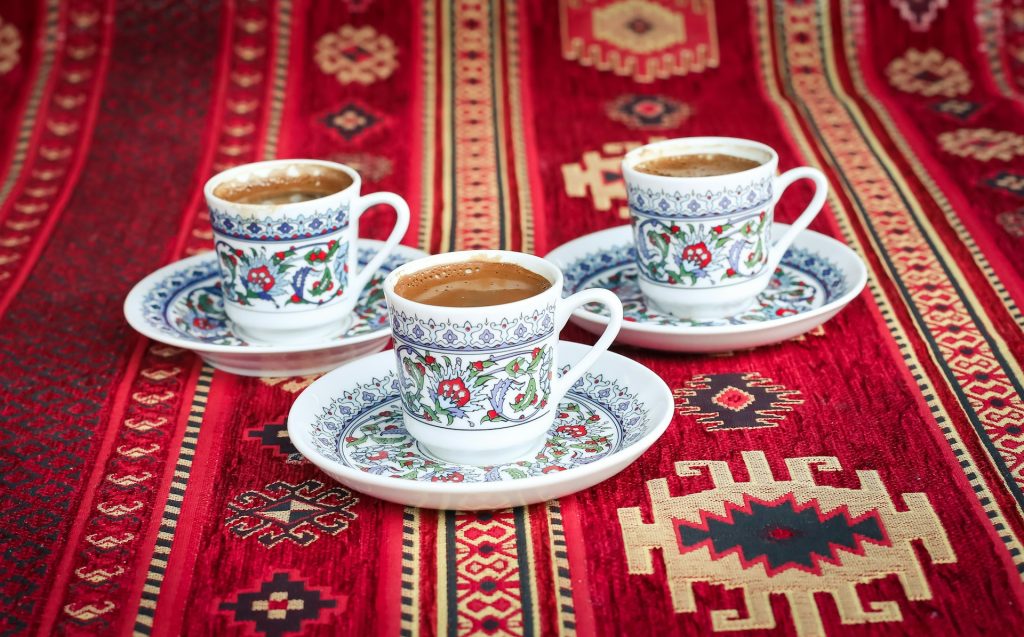Table of Contents
Have you ever tasted a coffee so rich it felt more like a ritual than a simple drink? Turkish coffee is exactly that—a centuries-old tradition that combines bold flavors with warm hospitality. It’s not just about getting a caffeine fix; it’s about embracing a piece of cultural heritage in every single sip.
Deep Roots and History
Turkish coffee traces its origins back to the Ottoman Empire, where it quickly became a staple of social life. People would gather in coffeehouses to discuss news, share stories, and enjoy a small cup of thick, dark brew. Over time, these coffeehouses grew into hubs of culture, politics, and art. Today, you can still feel that same sense of community when you sip Turkish coffee in a local café or in someone’s home.
Unlike many modern brewing methods, Turkish coffee is prepared in a special pot called a “cezve.” Ground coffee beans—almost powdered in texture—are mixed with water (and sugar if you prefer) before being simmered over low heat. That slow, careful heating process allows the flavors to develop gradually, resulting in a brew that’s both strong and smooth. It’s also the reason Turkish coffee is served unfiltered, with the fine grounds settling at the bottom of the cup.
The Art of Brewing

One of the things that sets Turkish coffee apart is the attention to detail. This isn’t something you toss into a machine and forget. You need to watch carefully as the mixture warms, forming a frothy foam on top. Right before it boils over, you remove the cezve from the heat, let the foam settle, and then put it back. This step can repeat a couple of times, each moment capturing a richer flavor and a denser foam. If done well, you’ll see a beautiful layer of froth sitting on top of your coffee when it’s poured into the cup.
For many people, the real joy is in those subtle differences that come from personal technique. Some might stir the coffee as it heats, while others let it sit until the foam rises. Some prefer a pinch of sugar in the pot, while others keep it dark and robust. There’s no single “right” way—much like a signature dish, each household or café has its own spin that loyal fans swear by.
Because of its unfiltered nature, Turkish coffee has a bold taste, often with earthy notes and a slight sweetness if you’ve added sugar. The texture is thick and almost velvety, a far cry from the watery cups you might get from drip machines. It demands that you sip slowly, letting the flavors unfold bit by bit.
Serving and Presentation
If you visit a Turkish household or a traditional café, don’t be surprised if your coffee arrives on a small tray alongside a glass of water and maybe even a sweet treat like Turkish delight or chocolate. The glass of water is there for a reason: it helps cleanse your palate before taking that first sip, so you can taste the full depth of the coffee. And the sweet treat? That’s just a bonus to balance out the coffee’s intensity or round off the experience with a hint of sugar.
Presentation matters just as much as taste. In many Turkish homes, they bring out their best cups for guests, often with ornate designs and matching saucers. It’s a small gesture that shows how highly they value hospitality. This sense of ceremony extends to business settings, too. Offering a cup of Turkish coffee can be a way to break the ice, show respect, or simply welcome someone into your space.
If you’re new to Turkish coffee, remember that you don’t gulp it down. Take small sips, pausing to appreciate the aroma and thickness. Because the grounds are in the cup, you might find a bit of sediment at the bottom—so don’t tilt it too far or you’ll end up with a mouthful of coffee mud. It’s perfectly normal to leave that last bit behind.
Fortune Telling and Fun Traditions
For an extra twist, Turkish coffee often comes with a bit of light-hearted fortune telling. Once you finish your cup, you can turn it upside down on the saucer and let the remaining grounds slide down. After a few minutes, a friend or family member might lift the cup and “read” the patterns in the sludge. They might see shapes that look like animals, letters, or abstract images, all of which are said to hold meaning about your future.
Is this scientifically proven? Not at all. But it’s an enjoyable way to bond, laugh, and share a moment of connection. It speaks to the deeper role that coffee plays in Turkish culture: something that brings people together, sparks conversation, and keeps old traditions alive. Even if you’re skeptical about fortune telling, it’s hard not to be charmed by the idea that your coffee cup might hold a secret message, if only for fun.
A Symbol of Hospitality

Hospitality is big in Turkey. If you’re a guest, your host will likely offer you a coffee almost as soon as you walk in. Refusing it might be seen as turning down their welcome, so it’s polite to accept—even if you only plan on taking a few sips. Some hosts might also ask how you’d like it: sweet, medium-sweet, or no sugar. Feel free to say your preference, since it’ll be prepared specifically for you.
Tips for Making Turkish Coffee at Home
If you’re inspired to try making Turkish coffee in your own kitchen, it’s easier than you might think. All you need is a cezve (sometimes called an ibrik), finely ground coffee, and water. If you like it sweet, add sugar right from the start, as it dissolves better before the coffee heats up. Stir the mixture, then place it over low heat. Watch closely for the foam to rise; that’s your cue to remove it from the heat, let it settle, and then repeat the process once or twice for a richer flavor.
Serving it in small demitasse cups with a glass of water on the side captures the authentic feel. You might also set out some small candies or Turkish delight for your guests. It doesn’t take much to recreate that sense of warmth and hospitality at home. Even if you can’t replicate the entire cultural backdrop, you’ll get a taste of the ritual that makes Turkish coffee so special.
Something More Than Caffeine

Turkish coffee isn’t a drink you gulp down on your way to work; it’s a reason to pause, connect, and appreciate the moment. The thick consistency, the robust flavor, and the entire tradition that surrounds it have turned it into a symbol of hospitality and friendship. It’s a way to welcome guests, test romantic partnerships (with a little humor), and even have fun reading leftover grounds.

I’m Audrey, a dedicated mother of teenagers with an insatiable love for coffee. On BeanBrewLove.com, I intertwine my need for caffeine with reflections on life. Whether expressing a nostalgic sentiment or injecting a hint of sarcasm, my blog is a reservoir of coffee culture, brewing techniques, and global coffee reviews.




